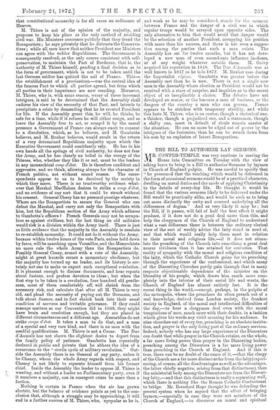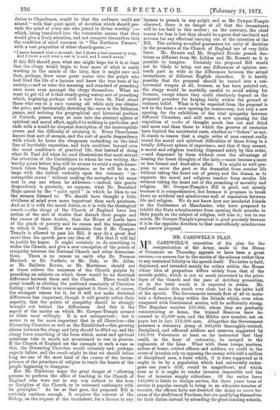THE BILL TO AUTHORIZE LAY SERMONS.
A/f R. COWPER-TEMPLE was very cautious in moving the
House into Committee on Tuesday with the view of asking leave to bring in a Bill to authorize Sermons by laymen in Church of England pulpits. He was careful to specify that "he presumed that the teaching which would be delivered in the form of occasional sermons would be of a practical character, dwelling on moral duties and the mode of applying Christianity to the details of every-day life. He thought it would be found that the various sermons likely to be delivered under the Bill would be practically alike, and would be such as to bring out more distinctly the unity and concord underlying all the differences of dogma." And so very likely it may be ; but the Bill, if it passes, will fail of half the best effect it might produce, if it does not do a good deal more than this, and help the clergymen of the Church of England to understand what a vast difference there is between the ordinary clerical view of the sort of weekly advice the laity stand in need of, and that which would really help them most in relation to their moral and religious life,—if it does not saran- late the preaching of the Church into something a great deal nearer vividness than it has attained for centuries. That reality of sympathy with the moral and religious condition of the laity, which the Catholic Church gains for its preaching through the experience of the confessional, and which many of the Dissenting Churches partly gain through that in many respects objectionable dependence of the minister on the liberality of his people, which draws him much more com- pletely into the interior of their social life and wants, the Church of England has almost entirely lost. It is the rarest thing in the world,—except, perhaps, in the pulpits of the metropolis, where the preachers do often preach out of a real knowledge, derived from London society, the frankest society in England, of the moral and intellectual difficulties of the day,—to hear a clergyman deal even with the moral temptations of men, much more with their doubts, in a fashion which gives his words any vivid meaning for his audience. In nine churches out of every ten, preaching is an obsolete institu- tion, and prayer is the only living part of the ordinary services. Indeed, nobody who has any large experience of the Dissenters can doubt that while prayer in the Church retains, on the whole, a far more living power than prayer in the Dissenting bodies, preaching among the Dissenters is a far more living power than preaching in the Church of England. And if this is true, there can be no doubt of the cause of it,—that the clergy of the Church are a far more distinct order from the laity (experi- encing, of course, all the disadvantages as well as the advantages, the latter chiefly negative, arising from that distinctness), than the ministerial body among the Dissenters are from the Dissent- ing laity,—and that this distinctness is really a separating wall, which there is nothing like the Roman Catholic Confessional to bridge. Mr. Beresford Hope thought he was defending the present system when he argued that the effect of bringing laymen,—especially in case they were not members of the Church of England,—to discourse on moral and spintual duties to Churchmen, would be that the audience could not attend "with that quiet spirit of devotion which should per- vade the mind of every one who joined in divine worship" ;- which, being translated into the vernacular, means that they would give a lively attention, and not compose themselves into the condition of mind common to "The Northern Farmer," with a vast proportion of other church-goers ;- "I never knawed what a meaned ; but I thowt a had snmmat to saiiy, And I thowt a said what a owt to 'a said, and I cum'd awaiiy."
If this Bill should pass, what one might hope for it is at least that the clergy would begin to hear more of what is really working in the minds of the laity, that it might now and then, perhaps, draw some great orator into the pulpit who had lived the life of a layman and knew the true tone of lay society,—and so raise the meaning and standard of preaching once more even amongst the clergy themselves. What we want to get rid of is that steady-going watery sort of preaching which, beginning perhaps with a text from St. Paul about those who run in a race running all while only one obtains the prize, and incidentally sketching the races in the Isthmian games, and noticing the geographical and historical position of Corinth, passes away at once into the abstract sphere of spiritual and moral effort, applied to nothing in particular, and ends with a would-be eloquent description of the incorruptible crown and the difficulty of attaining it. Every Churchman knows that sort of sermon, and the sort of gentle despondency with which he hears the clergyman embarking on the fatal line of inevitable exposition, and feels confident beyond even the usual confidence of practical life, that instead of doing what St. Paul did when he used illustrations that must attract the attention of the Corinthians to whom he was writing, the worthy priest before him will be as sure to avoid a single home- touch taken from English experience, as he will be to en- large with the dullest verbosity upon the visionary "in- corruptible crown" without making the metaphor a bit more real to any one whom he addresses : —indeed, this gentle despondency is precisely, we suppose, what Mr. Beresford Hope means by the "quiet spirit" in which he likes to see the sermon listened to. We should have thought a little vividness of mind even more important than such quietness. And as it is mith the moral duties, so it is with the theological creeds ;—the clergy of the Church of England have less notion of the sort of doubts that disturb their people and the 'causes of those doubts, than the House of Lords have of the pinch of poverty and its causes and the temptations to which it leads. Now we maintain that if Mr. Cowper- Temple is allowed to pass his Bill, it may do a great deal more than his speech gave any idea of. Not that it will fail to justify his hopes. It ought certainly to do something to widen the Church, and give a new conception of the points of sympathy between the National Church and other denomina- tions. There is no reason on earth why Dr. Norman Macleod, or Dr. Guthrie, or Mr. Dale, or Mr. Anon, or Mr. Baldwin Brown, or Mr. Martineau should not at times relieve the sameness of the Church pulpits by preaching on subjects on which there would be no doctrinal difference between them and the Church. There would be great benefit in eliciting the profound unanimity of Christian feeling ; and if there is no reason against it, there is, of course, the strongest reason for it, for it will not make doctrinal differences less important, though it will greatly soften their asperity, that the points of sympathy should be strongly brought out behind the differences. And this is the aspect of the matter on which Mr. Cowper-Temple seemed to dilate most willingly. It is not unimportant ; but it seems to us far more important that in all Churches—the Dissenting Churches as well as the Established—this growing chasm between the clergy and laity should be filled up, and the clergy learn something of the form which moral and spiritual questions take in minds not accustomed to run in grooves. If the Church of England set the example in such a case as this, the Dissenting Churches would certainly and, perhaps, eagerly follow, and the result might be that we should before long see one of the most fatal of the causes of the incom- petence of the preachers of religion to reach the hearts of the people beginning to disappear. But Mr. Gladstone urges the great danger of "allowing persons to perform the office of teaching in the Church of England who were not in any way subject to the laws or discipline of the Church, or in necessary conformity with its principles." As far as that goes, the proposed Bill is certainly cautious enough. It requires the consent of the Bishop, on the request of the incumbent, for a licence to any layman to preach in any pulpit, and as Mr. Cowper-Temple observed, there is no danger at all that the incumbenta will be too bold in this matter ; on the contrary, the chief reason for fear is lest they should be a great deal too timid and nervous for any effectual carrying out of the intention of the Bill. The existing so-called guarantees for unity of doctrine in the preachers of the Church of England are of very little force. Mr. Haweis and Mr. Stopford Brooke preach doc- trines as different from Mr. Liddon and Mr. Bennett as it is possible to imagine. Certainly the proposed Bill would not be likely to bring out any differences of opinion one- tenth part as wide as the differences between the actual incumbents of different English churches. It is hardly possible that the proposal should be turned into a con- troversial weapon at all, because, as has been pointed out, the clergy would be morbidly careful to avoid asking for licences, except where they could absolutely depend on the proposed preacher for keeping fairly within the ground of common belief. What is to be expected from the proposal is not in the least a new opening for controversy, but only a new opening for the exhibition of the vital sympathy between different Churches, and still more, a new opening for the exposition of modes of thought much less cut and dried and more real than those to which the grooves of centuries have limited the ministerial caste, whether in "Orders" or not. It stands to reason that a single order of men cannot really sound the moral and spiritual difficulties of those living in a totally different sphere of experience, and that if they cannot, a moral and religious teaching dispensed solely by this order, —and dispensed by them without even the advantage of hearing the freest thoughts of the laity,—must become a more or less formal and dead-alive affair. You might as well pro- pose to sever the poet or the dramatist from secular life without taking the heart out of poetry and the drama, as to separate the moral and religious teacher from secular life without taking the heart out of the preaching of morality and religion. Mr. Cowper-Temple's Bill is good, not merely because it is comprehensive, but because it proposes to break down an artificial and mischievous wall of separation between life and religion. We do not know how our secularist friends at the Conference at Manchester, who have proposed to inhibit the State schoolmasters from opening their mouths to their pupils on the subject of religion, will take it ; but to our minds, Mr. Cowper-Temple's proposal is good precisely because it is in the opposite direction to that marvellously mischievous and narrow proposal.



































 Previous page
Previous page